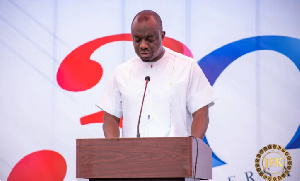Business News of Saturday, 4 September 2021
Source: business24.com.gh
Ghana’s public finances in a difficult state - Institute for Fiscal Studies
Policy think tank Institute for Fiscal Studies (IFS) has asked government to make some hard choices to realign public spending in favour of public investments by cutting down the rate of growth in workers’ compensation and eliminating non-essential expenses to minimise borrowing.
According to an analysis by the economic think tank, government’s inability to mobilise adequate domestic revenue amid serious expenditure management issues and strong appetite for extra-budgetary fiscal activities has placed the public finances in a dire state.
“All extra-budgetary fiscal activities have to stop; all such transactions must be brought and managed within the national budget as part of the budget lines, coupled with an urgent need to dramatically increase revenue mobilisation,” Leslie Dwight Mensah, a research fellow of the institute, said in a presentation on the state of Ghana’s public finances.
Public sector revenue has performed poorly over the last eight years, with a sharp fall in the average growth rate of total government revenue and grants, both in nominal and real terms, the analysis showed.
Ghana’s debt service to revenue ratio is alarming and one of the highest in the world, reflecting high cost of borrowing and low revenue mobilisation, the IFS further indicated.
“Revenue mobilisation has failed to keep pace with the growth of the economy, and that’s the revenue problem facing the nation,” Mr. Mensah said.
According to him, Ghana’s high cost of borrowing against its low revenue mobilisation explained its high interest burden.
Ghana’s official fiscal balance improved from an average deficit of 6.5 percent of GDP between 2013 and 2016 to an average of 4.4 percent from 2017 to 2019. Last year, the deficit spiked to a record 11.7 percent of GDP.
The IFS presentation showed that two expenditure items, employee compensation and debt service, currently consume the entire government revenue, making the government resort to borrowings to finance other obligations such as capital expenditure, purchase of goods and services, and transfers to statutory funds.
Amid these difficulties, the think tank sees as worrying the fall in government investment spending, which could undermine the nation’s long-term economic growth and development.
The IFS has already advised government to take controlling interest in the nation’s extractives sector, from which it could generate enough domestic revenue to curtail its hunger for borrowing.











